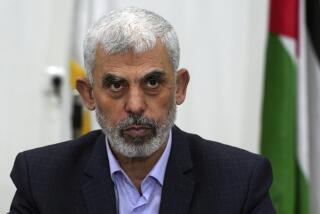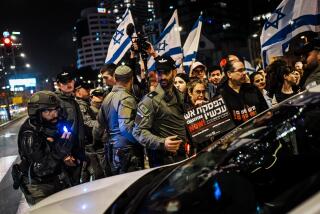He Disavows Talks With Those Linked to PLO : Shamir Irked by Party’s Arab Contacts
- Share via
JERUSALEM — A controversy has blossomed in Israel over disclosures that officials of Prime Minister Yitzhak Shamir’s party have held political discussions with Palestinians who are regarded as being close to the Palestine Liberation Organization.
It is an uncomfortable turnabout for the Herut Party, the leading faction in the right-wing Likud Bloc, which in the past has adhered to an uncompromisingly hard-line stand on the future of the occupied territories and has led the political charge against Israelis having contacts with the PLO, which it regards as a terrorist organization.
“The significance is that the meetings took place at all,” said an Israeli journalist who follows Li-kud’s internal maneuvering. “It’s the first time Likud has met with anyone connected with the PLO.”
In addition to Shamir, Herut’s prominent members include Ariel Sharon, a hawk on defense matters who advocates establishing a Palestinian state in Jordan, and Michael Dekel, a deputy defense minister whose supporters have called for increased Jewish settlement in the West Bank and forced “transfer” of the Arab population from the territory.
Since the talks were disclosed last Friday, the principal official involved, Moshe Amirav, a member of Herut’s Central Committee, has been disavowed by Shamir, condemned by other members of Li-kud and attacked by Likud’s adversaries in the centrist Labor Alignment, which is Likud’s partner in the coalition government.
Amirav met over a period of four months with three Palestinians--Sari Nusseibeh, a professor of philosophy at Birzeit University on the West Bank; Salah Zuhaika, an editor of the East Jerusalem newspaper Ash Shaab, and Faisal Husseini, a leading West Bank nationalist figure.
Nusseibeh, an articulate moderate and the son of a former Jordanian Cabinet minister, was attacked Monday morning on the Birzeit campus by four masked men and was hospitalized with a head wound and a broken arm. The attack followed the distribution of pamphlets by a Palestinian youth group accusing Nusseibeh of links with Likud.
Nusseibeh, who is regarded as an independent, also met another Herut leader, Ehud Olmert, a member of Parliament for the Likud Bloc, for general discussions on the future of the West Bank. Olmert is known as one of the rising younger generation of Herut.
The existence of such meetings suggests that elements of Herut, such as Olmert and Dan Meridor, another rising young party figure, have become concerned about the prospect of approaching an election against Labor without a concrete peace proposal to offer the voters.
Labor, led by Foreign Minister Shimon Peres, has called for the convocation of an international peace conference on the Middle East question, in which Israel presumably would offer territorial compromise to the Arabs in exchange for peace.
The focus of the controversy, however, was Amirav’s meetings with Husseini, the head of the respected Arab Studies Society in East Jerusalem, whom many Israelis consider the leading representative of PLO Chairman Yasser Arafat’s Fatah guerrilla faction in the West Bank. Husseini denies involvement with the PLO.
Hours after disclosure of the talks, Husseini was arrested and placed under six months’ administrative detention by army authorities. He had been free only 2 1/2 months from an earlier detention order.
A statement from Shamir’s office denied that the prime minister had any knowledge of the talks. It said: “Husseini and Nusseibeh, who are known to be PLO men, exploited Amirav’s naivete, but this has nothing to do with Likud, which is united in its negative attitude towards the PLO.”
And Shamir, speaking to a group of high school students in a Tel Aviv suburb, reiterated Monday that Israel would never negotiate with the PLO. Even if the organization renounces violence, he said, “ . . . the moment you sit with them and talk to them, it is as if you are surrendering . . . as if you are accepting their basic natural demands that we should evacuate all the land of Israel.”
Amirav said in an interview that he had conducted the meetings on his own initiative without informing Shamir. But he said he knew from “people close to him” that if a delegation of West Bank Palestinian leaders not connected with the PLO had come forward to discuss the Herut proposals on the future of the occupied territories, Shamir would have agreed to meet them.
Amirav said he is proposing direct negotiations with the Arabs, as espoused by Herut, but with the talks being conducted directly with Palestinians in the West Bank rather than with Jordan. He explained his meeting with Husseini by saying: “I know the talks won’t mean anything without the approval of the PLO. It might be a secret approval.”
Nusseibeh, in an interview with The Times before he was assaulted, said Amirav led him and the others to believe that he had access to Shamir and that the prime minister was aware of his moves.
Amirav came with a detailed proposal for what some have termed “super autonomy,” expanding what was proposed at the Camp David negotiations in 1978. He proposed an interim arrangement in the West Bank and Gaza Strip, which Israel occupied in the 1967 Six-Day War, providing for Palestinian control of the land and resources as well as autonomous rule over Palestinians.
His proposal called for creation of a demilitarized “Palestinian entity,” with its capital in East Jerusalem, its own flag, national anthem and currency. Defense and foreign affairs would be left to Israel.
Nusseibeh, who denied any “material contacts” with the PLO, said that the Palestinians found Amirav’s proposals “very positive” and that they reached a general understanding on the terms of an agreement. He said he believed that the talks would be a “stepping stone for negotiations between Israel and the PLO.”
While Amirav has been disowned by the Herut leadership, something that reportedly cost him an appointment as head of the Government Press Office, it is clear that other figures in the Herut leadership, including Olmert, have been discussing similar proposals.
Olmert said he had not seen Amirav’s plan but added, “It’s not a secret that Dan Meridor and myself are interested in coming up with an alternative to the international conference proposal.”
Olmert said that he and Meridor had always opposed meetings with Husseini because of his alleged PLO ties but that they remained “entirely in favor of getting in touch with Arabs who are not PLO.”
More to Read
Sign up for Essential California
The most important California stories and recommendations in your inbox every morning.
You may occasionally receive promotional content from the Los Angeles Times.













